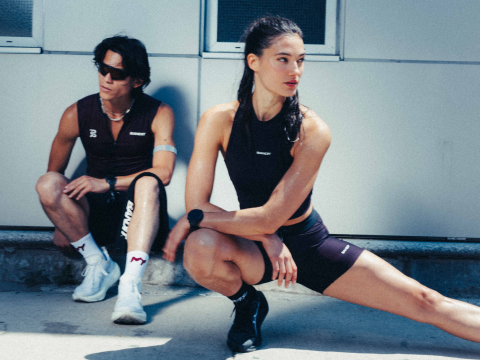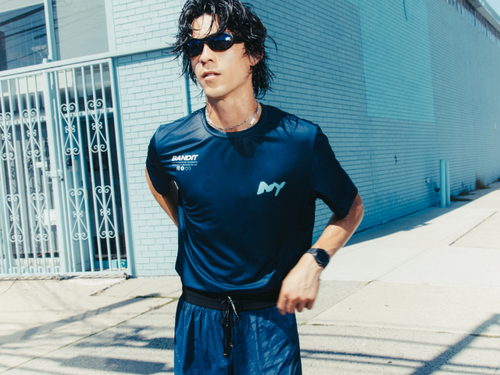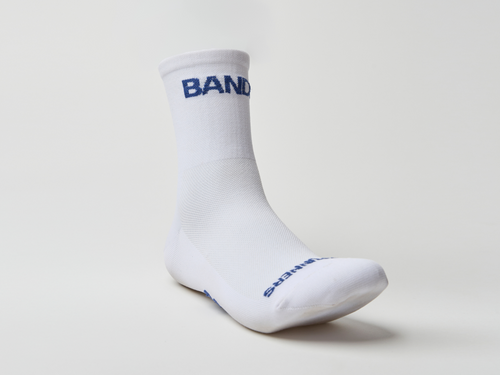Every Sunday at 7 a.m., a run crew meets at the intersection of East 35th Street and South Martin Luther King Drive on the South Side of Chicago, gearing up to run a 3- or 7-mile run, depending on each runner’s ambition for the day. The crew, aptly named 7 on Sundays, was co-founded by friends Aaron Ingram, Craig Taylor, and Ian Gonzalez - more on the crews inception here.

The trio wanted more runners on the streets representing the city’s South Side, which has been stigmatized because of its history with gun violence driven by pockets of poverty in mostly Black and brown neighborhoods. The South Side, they wanted everyone to know, is a perfectly safe place to run and 7 on Sundays was living proof of that.
So much of the running community in Chicago has been dominated by white runners and crews on the North Side who have popularized routes around Downtown Chicago, by the Lakefront Trail, around Grant Park, Lincoln Park, and the Chicago Riverwalk. The city has a legacy of segregation along racial and wealth lines—all of which makes visibility in the South Side that more important. Crews like 7 on Sundays and GumboFit have made large strides in the last few years to grow a vibrant and inclusive running community and remove a lot of the stigma associated with their neighborhoods.
Bandit talked to four members of the 7 on Sundays crew as they prepared to race the Chicago Marathon and asked them to share their stories of becoming runners in the South Side.
Keara

Keara Allen grew up in Chicago Heights, adopted by a family member into a household full of children. Her household felt chaotic, and she initially got into running as a form of escape but soon discovered that she was fast and had some talent.
On her high school track team, she raced the 4x800, the 4x400, and the 800 meter, competed with Amateur Athletic Union (AAU) leagues during her summers and eventually completed a degree at Chicago State University. It wasn't until she became a mother that she got into distance running.
“I think it can be hard for moms to tap back into their passions when they become parents,” Allen says. “It can be hard to prioritize, because what’s most important to us is to make sure our children have everything. I was lucky to be able to tap back into running and immerse myself in the community, meeting so many beautiful, genuine humans"
Allen discovered 7 on Sundays when she overheard someone talking about the group during one of her workouts. The crew has become a safe space for her—a second family—and they’ve given her a sense of fulfillment she hasn’t found elsewhere.

This is the second time Allen is running the Chicago Marathon and it’s a race of redemption: Conditions were hot and humid last year and Allen didn’t hydrate enough, pushing her body to the limit to get to the finish line. She ran a 4:40:27, but spent four days in the hospital being pumped with intravenous fluids.
“This time, I’m taking a step back and just trusting my training process,” she says. “What I’m learning about running is that you have to be flexible and reassess based off of your training cycle. I have no time goal—I just want to finish healthy, have fun, and be able to celebrate being a smarter runner.”
Allen is not just running for herself, but for her children. She has a child with special needs who currently can’t run, so she’s running for the both of them.
“I think the idea of having a son who can’t physically do the things that I can do physically, or that other healthy little boys his age can do—I think that has motivated me to see how far I can push myself.”
Jeremy

When he was on his high school track team, Jeremy Hall ran the 800, but he quickly realized that he was meant for distance running. It wasn't until he was in his mid-20s that he took distance running more seriously and discovered 7 on Sundays.
"When I started looking for running groups, most of the ones you see are up north, which has been a problem for representation," Hall says. "Now, through social media, we're able to learn about groups that have been running together for a long time down here."
Hall was just one of two Black kids on his high school's cross-country team. The first time he ran 13 miles as part of his training, he knew immediately that marathon running was in his future—the distance scratched an itch he never knew he had. During his junior year, he watched an MTV documentary in which Puff Daddy ran a marathon after just two months of training and thought, "If he can do that in two months, surely I can."
Hall's first marathon was Chicago in 2017, at the age of 30, which he ran in roughly five hours. His training plan was one he doesn't recommend: A mix of Googling and watching YouTube videos, paired with not enough long runs and very little speed work.

Hall has gained a lot of wisdom about structuring a proper training plan since then and managed to break four hours in Chicago last year, running a 3:57:12. He has an even more ambitious goal this year: sub-3:30. This is the first training block where he's been able to consistently run 50 miles a week and if conditions are cooler than they were last year, he's pretty confident he'll hit his goal.
"The marathon is my favorite day in the city because it feels like everybody just comes together," he says. "And it's seeing the look on people's faces—sometimes it's like, 'Man, y'all really doing this!?'"
Morgan

Morgan Jackson started running in the South Side's South Shore, born into a family of runners who had runners' bodies. But the marathon didn't cross her mind until she moved to Montpellier in the South of France for a job teaching English.
She was in an unfamiliar country and didn't know anyone, so she started running as a way to learn about the city she was living in, and soon set her sights on Paris in the spring to run her first marathon. For Jackson, who spent her youth racing the 800, the marathon was a rite of passage—her father has run more than 50 marathons so she knew she'd end up running one too. Her only goal for Paris was to finish, and her father was in the crowd to cheer her on. She finished in 4:30:25, happy but exhausted, and thought, "Okay, I checked this off the bucket list and I'm done with this race."

That changed when she moved back to Chicago in May and, as fate would have it, came across 7 on Sundays while she was out with a friend at Promontory Point. Jackson inquired about the crew and was running with them the next weekend. Soon, she decided she would run Chicago as a way to get a better understanding of her city, just as she had done in Montpellier.
Training for Chicago has been incredibly challenging. Shortly after Jackson signed up to run the marathon, her brother passed away. Suddenly her priorities had changed: Running took a backseat to grieving and new obligations.
"When I was in France, I was completely on my own doing my own thing," Jackson says. "Now, that's just not the case. I'm spending my time with my brother's wife and their kids trying to help out in any way I can. If they need me from 9 a.m. to 9 p.m., I'm not running that day, you know?"
She briefly considered dropping out of the marathon but decided that it was something that could help her restore some joy and structure back into her life.
"It literally gives me a reason to get out of the house, get out of bed, get out of my mind," she explains. "So, yeah, I've just been riding that. It'll be my first Chicago Marathon and I've heard wonderful things. My dad will be at multiple locations. If it were possible for him to meet me at every single mile, I'm sure he'll do that."
Gabriel

Growing up, Gabriel Moreno's dad would take his kids out to a track to run relay races using popsicle sticks near their home in Galesburg, a rural town three hours southwest of Chicago, which instilled a love of running in Moreno at an early age.
When he moved to Chicago to get a master's in fine arts from the University of Chicago, he decided he'd run the marathon without any real training and finished in 3:16:39 in 2016. He took a break from racing shortly thereafter.
"I was still running about 20 miles a week, but it was more for the joy of getting out and moving a little bit," he says. "I was in a different season of my life: If I had a run planned and friends wanted to get a drink, I would just go do that instead."
Moreno, like a lot of people, started seriously running again when the pandemic hit as a way to bring some structure back into his life. That's when he discovered 7 on Sundays on social media and learned about run crews for the first time, which felt much different than the teams he was on in high school and college where everyone was in competition with one other.

"I had an immediate wake-up call," he says. "Here was a group of individuals who all had their own running goals in terms of races, but also had their own unique stories about how they found their way into running. There was space for everyone."
Moreno's personal goal was to break three hours in the marathon and qualify for Boston, which he managed to do at the Monumental Marathon in Indianapolis last year after nailing down a proper fueling strategy, running a 2:52:14. This year's race in Chicago will be his fifth marathon, and his current goal is to see how much he can improve upon his time.
"I've spent a year doing consistent running and I'm feeling like I have a level of fitness I haven't had since college," he says. "So there's a bit of, 'Let's see how much faster I can go.'"
For Moreno, a big part of racing Chicago is being able to run through the city he lives in, experiencing all the different neighborhoods, and falling in love with Chicago all over again. It's also made him think critically about where he runs in the city and why.
"A big part of running that I'm constantly thinking about is: 'How does this act of individual movement or collective movement through this urban space change how we see that space?' There's always this question, especially as a South Side crew, about why isn't the South Side a staple in the marathon? Why do runners go where they always go? It's about comfort and social context and 7 on Sundays is a crew that is productively breaking that down. This isn't just some no-man's land. There's a lot to be seen, and celebrated, and respected here."













